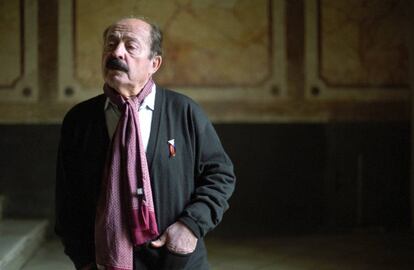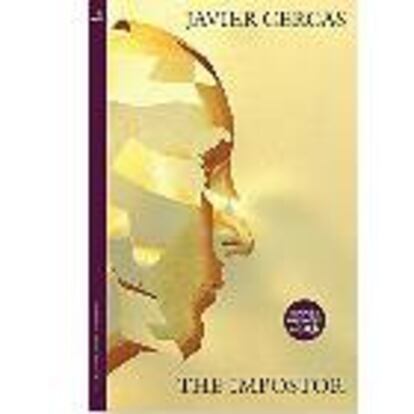A true tale that’s stranger than fiction
In his book ‘The Impostor’ Spanish writer Javier Cercas explores the life of Enric Marco, who claimed to be a concentration camp survivor but who was actually weaving a web of lies

There is plenty of fiction in The Impostor, but none of it is written by Javier Cercas. The invented truth in this remarkable book comes from its eponymous protagonist, a Catalan who enjoyed the admiration of many Spaniards throughout the 1970s, 80s and 90s, until his unmasking in 2005 by a little-known historian. Enric Marco is not a fictional character – he’s now 96 years old – so this book is, in a sense, a true story. But many of the tales he very publicly told during those three decades were pure fantasy.
Taken together, they describe (or rather would have described) a life of bravery and defiance – a life that is carefully retold by Cercas in this fascinating book, which was published in English last year. But it’s not just in the meticulous unraveling of his subject’s invented past that the writer’s achievement consists; it’s also in placing Marco’s deception in its historical context. In doing so, Cercas offers compelling insights into a period of Spanish history that can be difficult for non-Spaniards to understand – namely, the Transition from dictatorship to democracy after the death of dictator Francisco Franco in 1975.
It’s not just in the meticulous unraveling of his subject’s invented past that the writer’s achievement consists; it’s also in placing Marco’s deception in its historical context
One of Marco’s “greatest hits,” as Cercas calls it, concerned a symbolic occurrence at the Flossenbürg concentration camp, in which he falsely claimed he was imprisoned by the Nazis during World War II. Upon being invited to play chess with an SS officer (so the story goes), Marco quickly realized that the dull-minded soldier was no match for him; yet he also sensed that a victory might cost him his life. The defiant inmate nevertheless refused to concede and thus won much more than a game of chess. “That day, I reclaimed my dignity,” he said when telling this richly detailed lie on Spanish TV in 2004: “I won the battle of Stalingrad.”

Not quite. Like many such stories that Marco told during his “golden age,” when he enjoyed fame and adulation in Spain for supposedly defying the Nazis and the Franco regime, it was pure fiction. He was never a prisoner of the Nazis, a fact that didn’t prevent him from serving as president of the Amical de Mauthausen, the Spanish association for survivors of the Mauthausen camp, for three years. Nor was he a committed opponent of Franco during the dictatorship, which was his other great lie. But everyone in Spain, or least most people in Spain, believed him up until a historian named Benito Bermejo exposed Marco in 2005.
Cercas grapples with the question of how Marco managed to dupe so many for so long, arguing that it was not just because of his subject’s undeniable flair for lying. It was also in part, he says, because in the first years after Franco’s death, Spaniards were telling themselves a collective untruth, or at least trying to forget about the recent past. “Marco invented a past for himself… at a moment when, all around him in Spain, almost everyone was embellishing, or gilding up, or inventing, a past…. With Franco dead, almost everyone began to construct a past to better face the present and prepare for the future.”
Cercas grapples with the question of how Marco managed to dupe so many for so long, arguing that it was not just because of his subject’s undeniable flair for lying
In post-Franco Spain, then, the general ambience proved a hothouse for deception, and Marco – ever the peerless opportunist – exploited it. His public success was also owed, says Cercas, to the Spanish “historical memory” movement, a movement that he says was at its “apotheosis” when Marco was also at the height of his fame. The public front of this movement is now the Association for the Recovery of Historical Memory: founded in 2000, it aims to identify and commemorate the forgotten victims of Franco’s dictatorship – the estimated 114,000 Republicans who were murdered by Fascists and whose remains now lie unidentified in unmarked graves all over the country.
Cercas’ analysis of post-Franco Spain will be invaluable for any non-Spaniard trying to understand this complex period
Cercas writes that “the expression ‘historical memory’ is ambiguous and deeply confusing,” and that it contains a contradiction: “Memory is individual, partial and subjective, [whereas] history is collective and aspires to be comprehensive and objective.” Marco’s achievement, he argues, was to capitalize on this “insoluble antithesis” by borrowing from other people’s experiences to embroider his invented past; and he did so at the time when there was huge public appetite in Spain for what Cercas calls “historical kitsch.”
Cercas’ analysis of post-Franco Spain will be invaluable for any non-Spaniard trying to understand this complex period. Yet it’s not just for this that The Impostor is a great book. It is also because of the intellectual depth and even-handedness with which Cercas explores Marco’s lifelong lie and his motivations for telling it. The causes of his actions were many and complex, and the audience for his stories wanted to believe them. We are left to make up our own minds about whether he was a genius storyteller and opportunist, or guilty of unforgivable and sustained deception. Or both.
BUY 'THE IMPOSTOR' ONLINE

Author: Javier Cercas.
Editorial: Quercus (2017).
Format: Hardback, paperback and ebook (432 pages)
Tu suscripción se está usando en otro dispositivo
¿Quieres añadir otro usuario a tu suscripción?
Si continúas leyendo en este dispositivo, no se podrá leer en el otro.
FlechaTu suscripción se está usando en otro dispositivo y solo puedes acceder a EL PAÍS desde un dispositivo a la vez.
Si quieres compartir tu cuenta, cambia tu suscripción a la modalidad Premium, así podrás añadir otro usuario. Cada uno accederá con su propia cuenta de email, lo que os permitirá personalizar vuestra experiencia en EL PAÍS.
¿Tienes una suscripción de empresa? Accede aquí para contratar más cuentas.
En el caso de no saber quién está usando tu cuenta, te recomendamos cambiar tu contraseña aquí.
Si decides continuar compartiendo tu cuenta, este mensaje se mostrará en tu dispositivo y en el de la otra persona que está usando tu cuenta de forma indefinida, afectando a tu experiencia de lectura. Puedes consultar aquí los términos y condiciones de la suscripción digital.








































